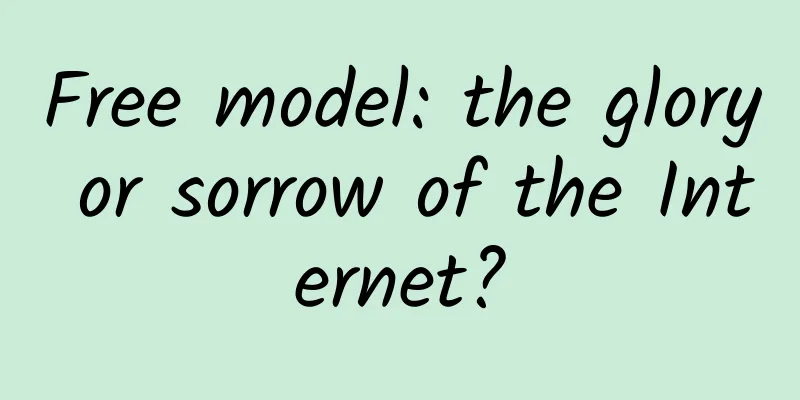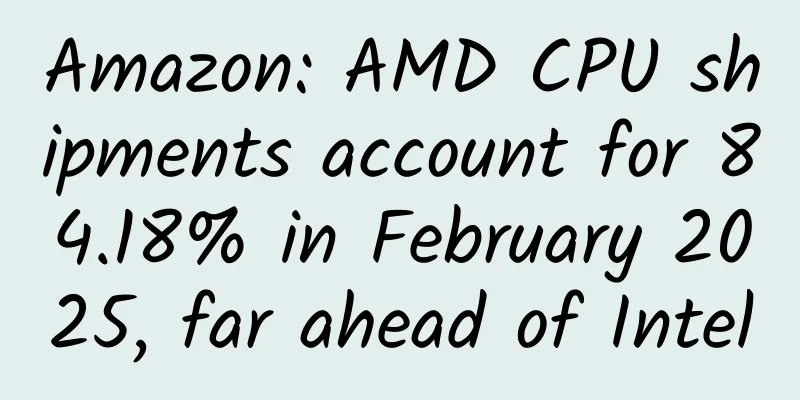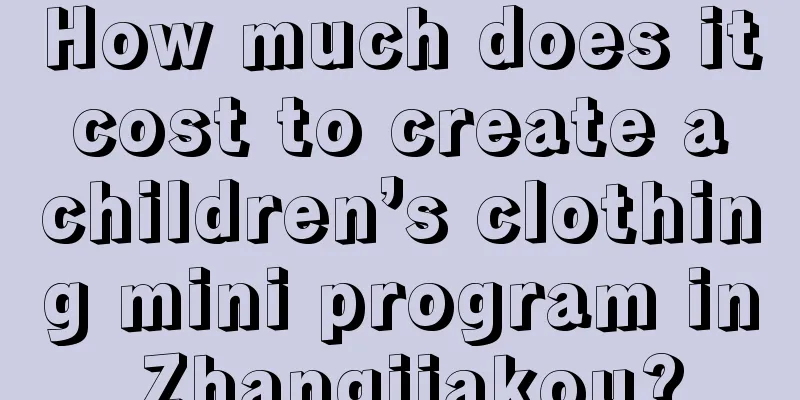Free model: the glory or sorrow of the Internet?

|
Not long ago, Ethan Zuckerman, the father of pop-up ads at MIT, apologized in a recent paper for inventing pop-up ads 20 years ago, "I'm sorry. Our intentions were good." However, the Internet should be grateful for advertising, because without advertising, there would be no Internet today. Google, the world's largest Internet company, has advertising revenue accounting for more than 90%, Facebook, the second largest Internet company, has advertising revenue accounting for more than 80%, and Yahoo, the third largest, has advertising revenue accounting for more than 50%. Among domestic Internet companies, Baidu mainly relies on advertising revenue. Alibaba, as the strongest e-commerce company, actually also gets its main revenue from advertising on its platform. Tencent's advertising revenue accounts for a slightly lower proportion, accounting for more than 10%. Tencent's main revenue comes from another bread and butter of the Internet - games, which will be discussed later. Other large and small upstream and downstream ecosystems are born around advertising. Even if they are not directly engaged in advertising, they are mostly a link in this chain. As Internet spiritual leader Chris Anderson said in "Free: The Future of Business", free is a new business model that represents the future of business in the digital network era. However, while it subverts the old model, it also has deep troubles. In this driving model, the smartest minds in the world are doing one thing: constantly racking their brains to find users' pain points, making all kinds of amazing products, attracting as many users as possible, and constantly occupying users' time, and then - pushing ads in various forms and with the highest efficiency to complete the profit model. Skipping these processes in the middle, in a word, the smartest minds are doing how to get more users to click on ads. This may sound a bit harsh, but the reality is that no matter how good a product is, it does not make money by relying on the product itself but on advertising. It is through advertising that value is converted, and in this process the value may be distorted. Advertisements (or hidden ads) may bring about a credibility crisis. The dispute between Zealer and Hammer a few days ago exposed the pain of Internet users. Zealer is very popular, but it also needs to survive. If it charges for videos, users may not really like it. Therefore, the most direct way to survive is to rely on mobile phone manufacturers, but relying on mobile phone manufacturers will inevitably lead to doubts about its products themselves. Even if the product has nothing to do with advertising, it will lead to a decline in product experience. A large number of products have gone through this life cycle: from becoming popular to starting to consider survival and profitability -> after introducing a profit model, the product is no longer so focused on user pain points à users gradually leave. After becoming popular, Weibo became a camp of various advertisements, causing a large number of users to flee; WeChat maintained cautious expansion, but ultimately could not resist the urge to seek a profit model, and now it has also begun to bloat, trying to cram in everything that makes money. Competition among users constantly stimulates products to develop in a direction that is more beneficial to users, while the free advertising profit model continues to affect the user experience. If the balance is off by even a fraction of a second, new competitors will have opportunities, and history is repeated over and over again. This makes every Internet user feel deeply conflicted. Therefore, the slogan "Don't forget your original intention" is so recognized. Perhaps only charging is the Eden of Internet people, and they no longer rely on advertising as a carrier, but earn income through the product itself. Unfortunately, once free starts, there is no turning back. In the open market, once there are similar free products, paid applications will find it difficult to survive, even if the paid applications are much better. Even in a closed system like the Apple Store, it is gradually moving towards free downloads. In addition to end users, the free model may not be so friendly to the enterprise side. For enterprises that rely on the Internet to survive first, they will taste the sweetness, reduce costs and increase revenue, but when a large number of enterprises use the Internet to survive, the cost may not be reduced, and they may even pay more. For example, Taobao is free for merchants to shop. Since there is no shop rent, products can be much cheaper, and merchants can sell at low cost and high efficiency. However, as the number of merchants increases, it becomes difficult to obtain user selection in the massive amount of information, and continuous investment is required to obtain users. When Taobao's direct train ads can compete for more than 10 yuan per click and dozens of clicks to obtain a single sale, the intermediary cost of a product that was originally reduced has been raised again, even higher than before, except that the intermediary cost has changed from the previous landlord to the Internet company. In essence, the Internet has greatly reduced the cost of information dissemination, which is the cornerstone of the free model. At the same time, when the cost of information dissemination approaches zero, it has greatly increased the cost of information selection, which is the cornerstone of the free model's profitability. Games are another victim of the free model. If the game itself is not free, but the intermediate process is free, then there will be more high-quality works that make people happy but not addicted. However, the model of free games and paid props or levels makes the game industry like drug addiction. The most important thing for game planners is to make people addicted, to magnify the irrational part of human nature such as competitiveness, so that continuous efforts will become a bottomless pit of money. At this time, the game becomes a boring but reluctant thing. Time is spent in continuous clicking. It is hard to say whether people are entertaining or game manufacturers are making people stupid. Is this really what every game product manager wants to do? The Internet is already a huge industry. Will the free model we are accustomed to reach a ceiling? Will there be a day when product managers can simply make a product that users love? Smart hardware may be a breakthrough. It has become a profitable carrier. People are beginning to accept the "annual service fee for tangible products" approach, which is the Internet's way of directly selling value. Maybe if this continues, the Internet will become truly independent. As a winner of Toutiao's Qingyun Plan and Baijiahao's Bai+ Plan, the 2019 Baidu Digital Author of the Year, the Baijiahao's Most Popular Author in the Technology Field, the 2019 Sogou Technology and Culture Author, and the 2021 Baijiahao Quarterly Influential Creator, he has won many awards, including the 2013 Sohu Best Industry Media Person, the 2015 China New Media Entrepreneurship Competition Beijing Third Place, the 2015 Guangmang Experience Award, the 2015 China New Media Entrepreneurship Competition Finals Third Place, and the 2018 Baidu Dynamic Annual Powerful Celebrity. |
>>: LeTV's new cross-border logic
Recommend
From online self-made to film company video websites are getting bigger and bigger
After the dispute over copyright content, online ...
It can cure diseases, cause diseases, and even "control" people's brains. How do intestinal flora have such powers?
Introduction: Gut microbes are called the second ...
30-minute Douyin live streaming sales speech process!
The three most critical steps in live streaming s...
“Seawater backflow” has become a hot search term. Why does the water from rivers flowing into the sea flow “backwards”?
Recently, seawater backflow has occurred in coast...
Complete guide to Tik Tok operations and the law of attraction!
This article explains the operation of TikTok fro...
Enterprise Weibo operation methods and strategies!
When it comes to corporate Weibo operations , aft...
A 63-year-old aunt suddenly started dancing and couldn't stop. It turned out to be caused by this common disease...
Expert in this article: Yang Chao, MD, attending ...
Online earning sideline project, you will get income if you browse, you can do it all over the world
Online earning sideline project, there is income ...
Why do I still get lung cancer even though I don't smoke or drink? Pay attention, this type of lung cancer has already targeted women
Spot check! Name a group of people at high risk f...
BAIC New Energy and Magna to establish joint venture to produce high-end electric vehicles
On June 18, Beijing New Energy Automobile Co., Lt...
Big reversal, iOS15.6 is better optimized than iOS14.8, and the battery life improvement is very satisfactory. I recommend upgrading
The official version of iOS15.6 was released last...
Movies adapted from games = bad movies? Deep thoughts on movies adapted from games
In recent years, China has introduced a large num...
Apple apologizes for iPhone slowdown, battery replacement price drops from 608 yuan to 218 yuan
[[215066]] Tencent Technology News: According to ...
There are 13 ways to play activities in the 2020 event planning plan
In 2020, will you continue with last year’s old r...









